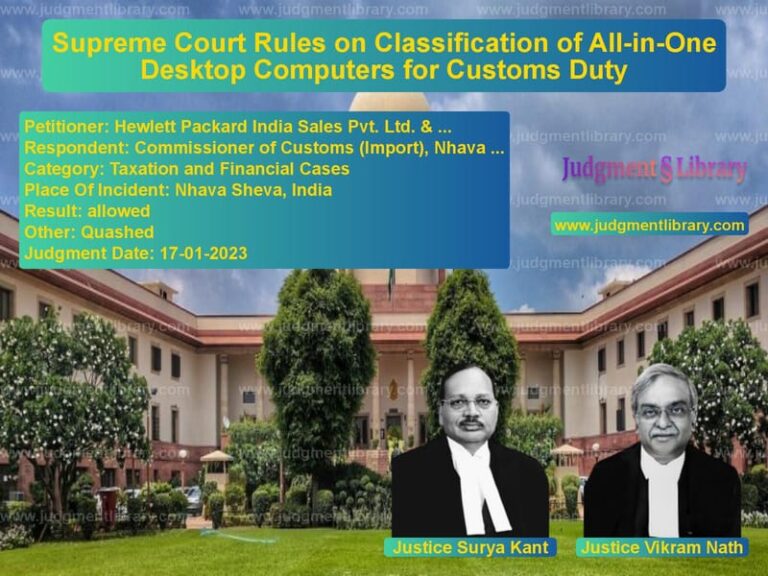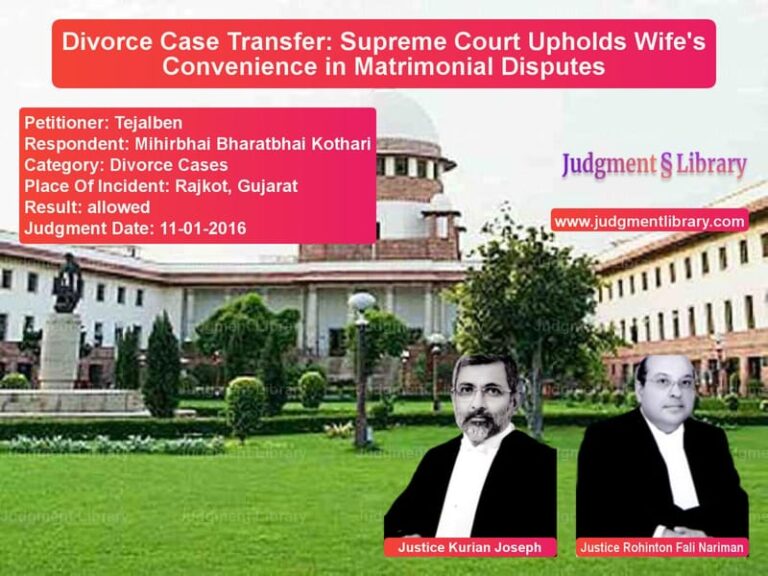NDPS Bail Case: Supreme Court Sets Aside High Court Order for Fresh Consideration
The case of Union of India v. Niyazuddin Sk & Anr. concerns an important legal question regarding the grant of bail in cases involving commercial quantities of narcotic substances under the Narcotic Drugs and Psychotropic Substances Act, 1985 (NDPS Act). The Supreme Court of India was called upon to determine whether the High Court had correctly applied the stringent conditions under Section 37 of the NDPS Act while granting bail to the accused.
Background of the Case
The respondents were charged under Sections 22 and 23 of the NDPS Act, which deal with the possession, sale, purchase, and transport of narcotic substances. The case was being tried in the Calcutta High Court. On September 22, 2014, the High Court granted bail to the accused, observing that:
- The accused had already been in custody for 203 days.
- The investigation was complete, and the chargesheet had been submitted.
- The narcotic consignment in question had already been seized.
- Further detention of the accused was deemed unnecessary.
However, the Union of India challenged this bail order before the Supreme Court, arguing that the High Court had not considered the mandatory requirements under Section 37 of the NDPS Act.
Key Issues Before the Court
- Did the High Court fail to comply with the mandatory conditions under Section 37 of the NDPS Act while granting bail?
- Was the accused eligible for bail under the stringent conditions imposed by the NDPS Act?
- Should the Supreme Court interfere with the High Court’s order and remand the case for fresh consideration?
Arguments of the Petitioner (Union of India)
The Union of India, represented by the Solicitor General, contended that:
- Section 37 of the NDPS Act imposes special conditions for granting bail in cases involving commercial quantities of drugs.
- The High Court did not examine these conditions before granting bail.
- The accused had been charged with a serious offense under the NDPS Act, and their release posed a risk to public safety.
- The High Court’s order did not take into account the Public Prosecutor’s opposition to the bail application.
Arguments of the Respondent (Niyazuddin Sk & Anr.)
The respondents argued that:
- They had already been in custody for more than 200 days without trial.
- The prosecution had completed its investigation and filed the chargesheet.
- The seizure of the narcotics consignment meant there was no further risk of tampering with evidence.
- The conditions for bail under Section 37 of the NDPS Act did not apply to them.
Supreme Court’s Analysis and Judgment
The Supreme Court, comprising Kurian Joseph and R. Banumathi, critically examined the legal framework governing bail under the NDPS Act. The key findings included:
1. Section 37 of the NDPS Act Imposes Strict Bail Conditions
- Section 37 applies to cases involving commercial quantities of narcotic substances.
- Bail cannot be granted unless two mandatory conditions are satisfied:
- The court must be satisfied that there are reasonable grounds to believe that the accused is not guilty of the offense.
- The accused is not likely to commit another offense while on bail.
2. High Court Did Not Consider Section 37’s Requirements
- The Supreme Court found that the High Court failed to consider these mandatory conditions before granting bail.
- There was no discussion on whether the accused were likely to be involved in future offenses.
- The Public Prosecutor’s opposition to bail was not adequately addressed.
3. Bail Order Set Aside for Fresh Consideration
- The Supreme Court quashed the High Court’s bail order and remanded the matter back for fresh consideration.
- The High Court was directed to decide the bail application in accordance with Section 37 of the NDPS Act.
- The Supreme Court requested the High Court to pass a fresh order within six months.
- Meanwhile, the first respondent (Niyazuddin Sk) was granted interim bail until the High Court passed a final order.
Final Judgment
- The Supreme Court allowed the appeal and directed the High Court to reconsider the bail application in line with the NDPS Act.
- The High Court was instructed to carefully examine whether the accused met the strict requirements for bail.
- The Supreme Court did not make a final decision on the bail application but emphasized the need for a detailed review under Section 37.
Conclusion
This judgment reinforces the strict conditions imposed under the NDPS Act for granting bail in drug-related offenses. It highlights the duty of courts to carefully assess the legal requirements before granting bail in cases involving commercial quantities of narcotics. The ruling serves as an important precedent for ensuring that judicial discretion in bail matters aligns with statutory mandates to prevent drug-related crimes.
Don’t miss out on the full details! Download the complete judgment in PDF format below and gain valuable insights instantly!
Download Judgment: Union of India vs Niyazuddin Sk & Anr. Supreme Court of India Judgment Dated 28-07-2017.pdf
Direct Downlaod Judgment: Direct downlaod this Judgment
See all petitions in Bail and Anticipatory Bail
See all petitions in Judgment by Kurian Joseph
See all petitions in Judgment by R. Banumathi
See all petitions in allowed
See all petitions in Remanded
See all petitions in supreme court of India judgments July 2017
See all petitions in 2017 judgments
See all posts in Criminal Cases Category
See all allowed petitions in Criminal Cases Category
See all Dismissed petitions in Criminal Cases Category
See all partially allowed petitions in Criminal Cases Category







